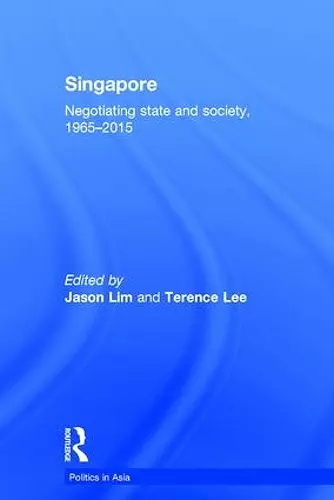Singapore
Negotiating State and Society, 1965-2015
Terence Lee editor Jason Lim editor
Format:Hardback
Publisher:Taylor & Francis Ltd
Published:15th Jun '16
Currently unavailable, and unfortunately no date known when it will be back
This hardback is available in another edition too:
- Paperback£49.99(9781138998650)

On 9 August 2015, Singapore celebrated its 50th year of national independence, a milestone for the nation as it has overcome major economic, social, cultural and political challenges in a short period of time. Whilst this was a celebratory event to acknowledge the role of the People’s Action Party (PAP) government, it was also marked by national remembrance as founding Prime Minister Lee Kuan Yew died in March 2015.
This book critically reflects on Singapore’s 50 years of independence. Contributors interrogate a selected range of topics on Singapore’s history, culture and society – including the constitution, education, religion and race – and thereby facilitate a better understanding of its shared national past. Central to this book is an examination of how Singaporeans have learnt to adapt and change through PAP government policies since independence in 1965. All chapters begin their histories from that point in time and each contribution focuses either on an area that has been neglected in Singapore’s modern history or offer new perspectives on the past. Using a multi-disciplinary approach, it presents an independent and critical take on Singapore’s post-1965 history.
A valuable assessment to students and researchers alike, Singapore: Negotiating State and Society, 1965-2015 is of interest to specialists in Southeast Asian history and politics.
"This edited volume was published in part to acknowledge the 50th anniversary of the founding of Singapore. However, the editors establish at the outset that they are seeking to look critically at Singapore’s history and culture, so the book is not supposed to serve merely as a celebratory volume of the city-state’s achievements. With this intent in mind, the contributions cohere very well and ultimately present a very useful picture of Singapore today. The 13 chapters cover a range of interesting issues, including such sensitive topics as the mechanics of single party rule, race, language, and religion. All the contributors know Singapore well, and though the chapters are relatively short, their analyses are knowledgeable and nuanced. Although Singapore is not generally a significant focus for teachers in the US, the book will be a reliable resource for university collections that cover religion and ethnicity in Asia, Southeast Asian politics, or other political science collections that might want to examine how Singapore’s somewhat idiosyncratic political system plays out in practice in people's lives."
S. Maxim, University of California, Berkeley
Summing Up: Recommended. All academic levels/libraries.
ISBN: 9781138998629
Dimensions: unknown
Weight: 498g
264 pages